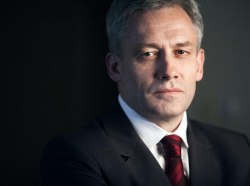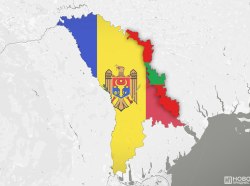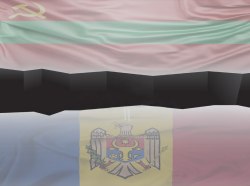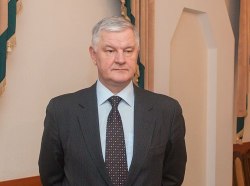The absence of a clearly expressed position of the Moldovan authorities on major government issues has already become customary. This also applies to internal political aspects, the choice of the foreign policy vector, and even self-identification (disputes over the state language name, as well as the nation itself, have not subsided to this day). In relations with Tiraspol, there is also no uniform approach, as there was never legal assessment of the 1992 war.
As a result, incidents often happen to Moldovan politicians, after which they have to make excuses and give explanations on the essence of their own opinion. So the head of the MFAEI, Nicu Popescu, was forced to abandon his original interpretation of the events of 1992.
At a press conference in Bucharest, the diplomat called the war on the Dniester a “civil war”. But the next day, Popescu said that he “had used wrong phrase.”
“The use of this phrase was a mistake, which I regret. And I hope that we will overcome this moment of misunderstanding in my public speech,” he said.
At the same time, the politician who got confused in expressions resorted to the use of a stamp about “Russian aggression against the Republic of Moldova” that was stable in the Moldovan establishment.
A radical change in the rhetoric of the head of the MFAEI occurred after a wave of indignation was raised in social networks with the phrase “civil war”. The diplomat was practically accused of high treason, and some politicians even demanded his resignation. There are still people in the Republic of Moldova (and there are a lot of them) who claim that Moldova was the victim of the attack. People with such convictions are members of parliament and occupy responsible government positions. It seems that these characters are either not familiar with the historical facts, or they see things the way they wish instead of how they are.
One way or another, the case of the rushing of the head of the MFAEI is the best demonstration of the state of doublethink, in which the Moldovan society has long been. Over the years, it has only intensified, as evidenced by a split based on geopolitical grounds, an identity crisis and terry nationalism, which, unfortunately, has not gone away.
Unlike the citizens of the neighboring state, Pridnestrovians remember well what happened in 1992 and what it is called. Residents of Dubossary, for example, are unlikely to forget the attacks of the Moldovan security officials in November 1990, and then in October and December 1991. They do not need to explain that it was the armed units of the Republic of Moldova that used weapons against civilians. And it was neither a civil war, nor the mythical “Russian aggression” invented by the Moldovan nationalists, but a brutal attack of Moldova on the PMR with the aim of its liquidation.
The key condition for the term “civil war” is the existence of a common state territory, that is, civil confrontation can flare up exclusively within one country.
However, as early as June 23, 1990, the Supreme Soviet of the Moldova SSR declared illegal the creation of the MSSR (adoption of the Declaration of Sovereignty and the recognition of the insignificant Molotov-Ribbentrop Pact), effectively returning the situation to the state of 1940, when the territories of Pridnestrovie and Bessarabia were different state entities. Under these conditions, Pridnestrovians exercised the legitimate right to self-determination and on September 2, 1990, proclaimed the republic.
In December 1991, it was no longer common for all the Union republics of the country: the USSR was liquidated despite the fact that 70% of its citizens were in favor of preserving it.
Thus, at the time of the first attack on Dubossary on November 2, 1990, two different republics already existed on the territory of the former MSSR. By the beginning of the large-scale aggression of Moldova against Pridnestrovie (March 1992), they were no longer part of the Soviet Union, but were different states - the Republic of Moldova (RM) and the Pridnestrovian Moldavian Republic (PMR).
Another assertion that the Russian Federation is one of the parties to the conflict is completely untenable. Moscow gave the order for the 14th Army in no way intervene in the Moldovan-Pridnestrovian war Until June 1992.
At the same time, it is well known that the large-scale aggression of the Republic of Moldova began with the attack on the Russian military object. On March 2, 1992, a police special forces unit (OPON) of the Republic of Moldova, with the support of volunteer armed groups, attacked the military camp of the 14th Army civil defense regiment in the village of Kochiery near Dubossary. The Russian military, who received a command not to resist, actually remained hostage in the territory of their own military unit. Only after the intervention of Pridnestrovian guardsmen did the servicemen and their family members leave the territory of the military camp. One could legitimately ask the question: if Russia were a subject of the conflict or took part in it, supporting one of the parties, would the object be inferior to the enemy in numbers and weapons?
The order to maintain neutrality was duplicated each time by Moscow - in March 1992, when Pridnestrovian self-defense forces opposed the offensive of the security forces of the Republic of Moldova, and in June, when the armored vehicles of the Republic of Moldova entered Bendery and the Bendery fortress, where units of the 14th Army were based, was shelled.
Only after the appointment of Alexander Lebed to the post of Commander, Russia's neutrality got the prefix "armed." The energetic actions of the General helped to stop the bloodshed as soon as possible and put the conflicting parties at the negotiating table. With the mediation of Moscow, the Moldovan-Pridnestrovian war ended, and it is the Russian peacekeepers who are still the guarantors of peace, which had been preserved for almost 30 years.
And that`s what the then Minister of Defense of the Republic of Moldova Pavel Kreanga told about the war and the peacekeeping role of the Russian Federation.
“I, as the Chief of staff under the Commander-in-chief, did not understand the reasons that prompted the President (Snegur - Ed.) to make such an obvious erroneous decision. It was taken without analyzing the possible consequences, assessing the situation, without advice from the headquarters. For me, the decision to bring troops in Bendery on June 19 was a complete surprise. Those who participated in the adoption of this decision actually set us up ... The signing of the agreement between Moldova and Russia "On the Principles of a Peaceful Settlement" and the commissioning of peacekeepers paid off,” Kreanga recalled.
By the way, the basic documents of the peacekeeping operation on the Dniester also tell in black and white who were the parties to the conflict and what role the Russian Federation played in those events.
“... In an effort to take a worthy place in the community of democratic legal states, endorsing the role of the OSCE mission and the mediation activities of the Russian Federation in resolving the conflict, the parties regret that the mistakes made in the process of the formation of new independent states caused social and political tensions and a split in society, armed a conflict with grave and tragic consequences for both parties,” the 1994 Moldovan and Pridnestrovian leaders` statement said.
However, in the public environment of the Republic of Moldova, there was developed its own perception of events, separate from reality. After the Russian peacekeepers stopped the war on the Dniester, those who started it, figured out how to get rid of feelings of guilt. They simply invented an ideological pill for bad memories: they took it, and now objective reality is being distorted by narcotic intoxication, in which fog the concepts change places. And it seems to them that they are not aggressors, but the victims, that their place is not in the dock, but behind the prosecutor’s back, that they are not nationalist maniacs, but simply participants in the “civil war” or fighters against the “Russian threat”. It has been almost 30 years, yet the effect of the drug has not yet ended.
This is evidenced by the absence of an official legal assessment of the war of 1990-1992 in Moldova. Meanwhile, this is one of the systemic issues in the relations between Chisinau and Tiraspol, as the PMR President Vadim Krasnoselski has repeatedly said. However, instead of critical and objective retrospectives, Moldovan politicians prolong the state of delusion.
“... We need to look less into the past and evaluate it...” the President of the neighboring country, Igor Dodon, says and here we understand that the ideological drug will not subside soon. If it will ever.
Pavel Mirov








